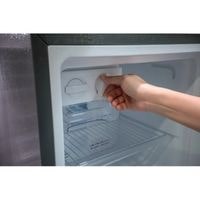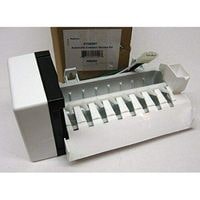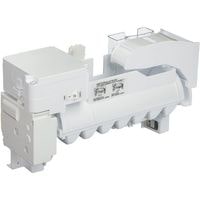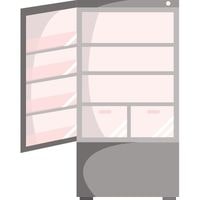Refrigerator Ice Maker Overflowing. When an ice maker stops dispensing ice and you check it only to find a huge sheet of ice, you must take action.
Even if you make the effort to thaw that single large piece of ice away, chances are it is going to return next time your ice maker does its job.
As you thaw the huge block of ice, it’s important to deduce why this issue occurred in the first place.
If your particular brand of free-standing electric freezer makes columns of thick frost every so often morning after the evening before work, there are two potential issues at hand.
Refrigerator Ice Maker Overflowing

If the water pressure is low, the valve may not close once the power has shut off.
The result is a leak of water into the ice maker that causes it to overflow. If the water pressure is sufficient but your ice maker still overflows, replace the inlet valve.
Our discussion here discusses some problems that may arise when the refrigerator’s ice maker overflows.
Weak Water Pressure
If one’s home happens to have low water pressure, this will affect the performance of the ice maker.
The water inlet valve needs at least 20 psi (pounds per square inch) to operate properly.
If it is not receiving a sufficient volume of water when turned on, then it may not close all the way when needed and the water flow gets halted.
As a result, the continued flow of up to 1 gallon per minute leads to overfilling and freezing of the ice machine. Check your home’s water pressure to locate water pressure at the source if this is a problem.
Ice Maker Check

Test the mechanism of the ice maker. Different parts may not work properly, causing them to malfunction.
Replace defective parts with new ones so that you can minimize damage from water overflow and other issues.
Before doing any repair or replacement yourself, make sure you have an idea of what components are available for your model.
For example, older models are harder to find replacement parts for, while newer models may be easier to find individual components for based on where they broke down.
Fill Tube Check
Take a look at the back of your freezer to locate and check out the tube. Make sure that it’s positioned properly and you can figure out if that’s causing problems with water dripping out of it; see whether or not the alignment is correct.
When you still cannot figure things out, then check out the user manual to make sure everything is in order; the manual should explain how this problem can occur since water gets into the machine from that tube.
Inlet Valve For Water
The water inlet valve needs to apply a pressure of at least 20 psi to shut off correctly. If there is not enough pressure then the valve might not close all the way once the power has been turned off.
As a result, water can leak through the open valve into the ice maker and cause it to overflow with water. Check your water pressure (which should be a minimum of 20 psi).
If it’s sufficient, then the problem could be with your Water Inlet Valve. It might not be shutting off all the way or maybe stuck open so that it doesn’t close properly.
If there is a lack of pressure but your ice maker is still overflowing then it means you will need to replace your Water Inlet Valve.
Ice Maker Assembly Problems

One component of the refrigerator ice maker assembly may be dysfunctional.
Since many of the ice maker components are not sold separately,
you probably need to purchase and replace the entire ice maker assembly.
Refrigerator Ice Maker Overflowing
Related Guides
